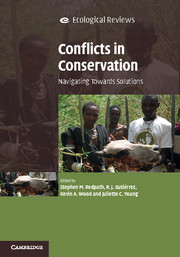Book contents
- Frontmatter
- Dedication
- Contents
- List of contributors
- Foreword by Georgina Mace
- Acknowledgements
- Part I Introduction to conservation and conflict
- 1 An introduction to conservation conflicts
- 2 Philosophy, conflict and conservation
- PART II Contrasting disciplinary approaches to the study of conflict in conservation
- Part III Approaches to managing conflicts
- Index
- Plate Section
- References
2 - Philosophy, conflict and conservation
from Part I - Introduction to conservation and conflict
Published online by Cambridge University Press: 05 May 2015
- Frontmatter
- Dedication
- Contents
- List of contributors
- Foreword by Georgina Mace
- Acknowledgements
- Part I Introduction to conservation and conflict
- 1 An introduction to conservation conflicts
- 2 Philosophy, conflict and conservation
- PART II Contrasting disciplinary approaches to the study of conflict in conservation
- Part III Approaches to managing conflicts
- Index
- Plate Section
- References
Summary
Philosophy has been described as ‘the conversation that Plato began’. In some remarks about ‘the role of philosophy’ in relation to environmental matters, Bernard Williams observed that “there is no special way in which philosophical considerations join the […] discussion” (Williams, 1995: 233). Nor, in my opinion, can philosophy be defined by reference to any set of doctrines. It is with some trepidation, therefore, that I attempt to provide a more informative characterisation of philosophy and of how it might help us to understand and manage conservation conflicts.
Philosophy and its methods
The reference to Plato is more helpful than it seems at first sight, provided we know something about Socrates, the ‘hero’ of Plato's dialogues. Socrates is depicted, typically, as conducting an ‘elenchos’ or refutation, in which someone's claim to knowledge is shown to be baseless, not on empirical grounds but because it can be shown by a process of sound reasoning that it either harbours a contradiction or leads to some other claim that is unacceptable. Because sound reasoning depends crucially on understanding the concepts through which any reasoning proceeds, Socrates undertakes to dissect the relevant concepts. Such ‘conceptual analysis’ has been central to philosophy ever since. Early philosophers thought of themselves as ‘lovers of truth’ or ‘lovers of wisdom’ (from the Greek, ‘philosophoi’) and hence as engaged primarily in a search for truth. The gap between those who sought truth using empirical methods (scientists) and those who continued with conceptual explorations (philosophers) widened gradually, although they can never be completely separate; Aristotle, for example, belongs to the canon of both science and philosophy.
Among philosophers, a division soon emerged between those who thought the point of philosophy was to find the truth, the so-called ‘dogmatists’, and those who thought the point of philosophy was to keep on searching for it, the so-called ‘skeptics’.
- Type
- Chapter
- Information
- Conflicts in ConservationNavigating Towards Solutions, pp. 19 - 32Publisher: Cambridge University PressPrint publication year: 2015
References
- 5
- Cited by



